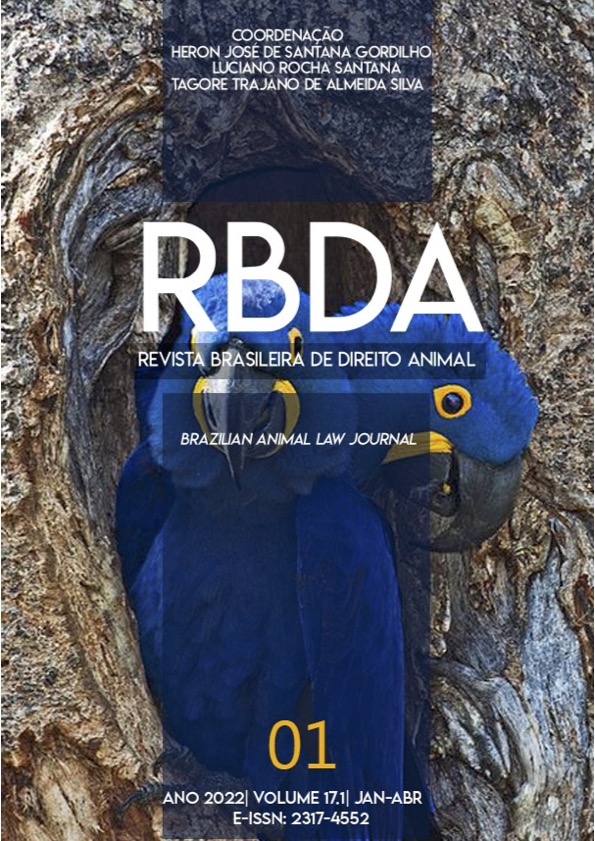THE GLOBAL RESET: A PATH TO TRANSHUMANITY
DOI:
https://doi.org/10.9771/rbda.v17i0.49230Keywords:
Pandemic. Humanitarian Reset. International Pandemic Treaty. Global Justice. Transhumanity.Abstract
The humanitarian crisis triggered by the pandemic has provoked important reflections about the need for a paradigm shift in the international community's posture in the post-pandemic environment, especially in terms of the re-signification of standards consolidated under the influence of the anthropocentric perspective, which guided the relationship between human beings and nature. In this context, in order to consolidate global justice, the work proposes as its general objective the legal institute of transhumanity, having as its specific objective the study of the humanitarian reset for the consolidation of multicultural and intercultural global citizenship. Using the deductive method, with documentary procedure and doctrinal, jurisprudential and legislative approach, the paper intends to confirm the premise that there is a need for humanitarian reset and global justice to conclude that humanity is capable of transcending itself and reconnecting with the unity inherent to it as a global tribe. The outcome of the research focuses on the scientific contribution regarding the legal institute referred to in the article as transhumanity. Thus, the central problem of the paper is the legal institutionalization of transhumanity in accordance with the principles of dignity, global solidarity and universal fraternity.
Downloads
References
BOSTROM, Nick. A history of transhumanist thought. Journal of Evolution and Technology, vol. 14, Issue 1, pp. 1-25, 2005. Disponível em <https://www.nickbostrom.com/papers/history.pdf>. Acesso em: 21 fev. 2021.
CASTELLS, Manuel. A hora do grande reset. Disponível em <https://outraspalavras.net/pos-capitalismo/castells-a-hora-do-grande-reset/>. Acesso em: 24 ag. 2021.
DARWIN, Charles. A Origem do Homem e a seleção sexual. 2ª edição, Hemus, 1875.
DELANTY, Gerard. Os desafios da globalização e a imaginação cosmopolita: as implicações do Antropoceno. Revista Sociedade e Estado, vol. 3, nº 2, Maio/Agosto 2018, pp. 373-388, 2018. Disponível em <https://www.scielo.br/pdf/se/v33n2/0102-6992-se-33-02-00373.pdf>. Acesso em: 22 fev. 2021.
ECO, Umberto. Migração e intolerância. Rio de Janeiro: Record. 2020.
FRASER, Nancy. A justiça social na globalização: redistribuição, reconhecimento e participação. Revista Crítica de Ciências Sociais, vol. 63, pp. 7-20, out. de 2002. Disponível em <https://www.ces.uc.pt/publicacoes/rccs/artigos/63/RCCS63-Nancy%20Fraser-007-020.pdf>. Acesso em: 16 fev. 2021.
HABERMAS, Jurgen. O futuro da natureza humana. A caminho de uma eugenia liberal? São Paulo: Martins Fontes, 2004.
HABERMAS, Jurgen. A inclusão do outro. Estudos de teoria política. Trad. George Sperber e Paulo Astor Soethe. São Paulo: Edições Loyola, 2002.
HARARI, Yuval Noah. Sapiens. Uma breve história da humanidade. 21ª ed. Trad. Janaína Marcoantonio. Porto Alegre: L&PM Editores, 2017.
HERRERA FLORES, Joaquim. Direitos humanos, interculturalidade e racionalidade de resistência. Trad. Carol Proner. Sequencia Estudos Jurídicos e Políticos, vol. 23, nº 44, pp.10-29, dec./2009. Disponível em <https://www.researchgate.net/publication/47427041_Direitos_humanos_interculturalidade_e_racionalidade_de_resistencia>. Acesso em: 27 fev. 2021.
HONNETH, Axel. Luta pelo reconhecimento. A gramática moral dos conflitos sociais. Trad. Luiz Repa. Editora 34. 2003.
HUXLEY, Julian. New bottles for new wine. London: Chatto & Windus, 1957.
KYMLICKA, Will. Multiculturalismo: o sucesso, o fracasso e o futuro. Interfaces Brasil/Canadá. Revista Brasileira de Estudos Canadenses, vol. 14, n. 1, pp. 123-174, 2014. Disponível em <https://periodicos.ufpel.edu.br/ojs2/index.php/interfaces/article/view/6788>. Acesso em: 08 jul. 2021.
KYMLICKA, Will. Multicultural Citizenship within multination states. Ethnicities, vol. 11, n. 3, pp. 281–302. 2011. Disponível em <https://www.researchgate.net/publication/254091347_Multicultural_Citizenship_within_multination_states>. Acesso em: 02 set. 2021.
POGGE. Thomas. Cosmopolitanism and Sovereignty. Ethics, vol. 103, no. 1, pp. 48-75, October, 1992. Published by: The University of Chicago Press. Disponível em < http://www.jstor.org/stable/2381495>. Acesso em: 10 abr. 2019.
POGGE, Thomas. Qué és la justicia global? Revista de Economia Institucional, vol. 10, n. 19, pp. 99-114, 2008. Disponível em <https://www.redalyc.org/pdf/419/41901905.pdf>. Acesso em: 13 set. 2021.
QUAMMEN, David. Contágio. Infecções de origem animal e a evolução das pandemias. São Paulo: Cia das Letras, 2020.
SOUSA SANTOS, Boaventura de. Direitos Humanos: o desafio da interculturalidade. Revista de Direitos Humanos, vol. 2, pp. 10-18, junho de 2009. Disponível em <http://www.boaventuradesousasantos.pt/media/Direitos%20Humanos_Revista%20Direitos%20Humanos2009.pdf>. Acesso em: 12 jul.2021.
SOUSA SANTOS, Boaventura. Para além do pensamento abissal: das linhas globais a uma ecologia de saberes. In: SOUSA SANTOS, Boaventura e MENESES, Maria Paula (0rg.). Epistemologias do Sul. Coimbra: Almedina, pp. 23-72, 2009. Disponível em <http://professor.ufop.br/sites/default/files/tatiana/files/epistemologias_do_sul_boaventura.pdf>. Acesso em:16 fev. 2021.
SOUSA SANTOS, Boaventura de. A cruel pedagogia do vírus. Coimbra: Editora Almedina. 2020.
TAYLOR, Charles. A política do reconhecimento. In: TAYLOR, Charles. Argumentos filosóficos. Trad. Adail Ubirajara Sobral. São Paulo: Edições Loyola, pp. 241-274.
UNESCO. Declaração das Raças da UNESCO de 1950. Disponível em <http://www.achegas.net/numero/nove/decla_racas_09.htm>. Acesso em: 11 ag. 2021.
UNESCO. Declaração Universal sobre a Diversidade Cultural. Disponível em <http://www.unesco.org/new/fileadmin/MULTIMEDIA/HQ/CLT/diversity/pdf/declaration_cultural_diversity_pt.pdf>. Acesso em: 08 jul. 2021.
Downloads
Published
How to Cite
Issue
Section
License
Copyright (c) 2022 Brazilian Animal Law Journal

This work is licensed under a Creative Commons Attribution-NonCommercial 4.0 International License.
1. Autores mantém os direitos autorais e concedem à revista o direito de primeira publicação, com o trabalho simultaneamente licenciado sob a Licença Creative Commons Atribuição 4.0 Internacional que permite o compartilhamentodo trabalho com reconhecimento da autoria e publicação inicial nesta revista.
2. Autores têm autorização para assumir contratos adicionais separadamente, para distribuição não-exclusiva da versão do trabalho publicada nesta revista (ex.: publicar em repositório institucional ou como capítulo de livro), com reconhecimento de autoria e publicação inicial nesta revista.
3. Autores têm permissão e são estimulados a publicar e distribuir seu trabalho online (ex.: em repositórios institucionais ou na sua página pessoal) a qualquer ponto antes ou durante o processo editorial, já que isso pode gerar alterações produtivas, bem como aumentar o impacto e a citação do trabalho publicado.












